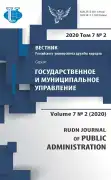Militia Counterinsurgency: Perspective on the Motivations of Civilian Joint Task Force Militia Participation in Northern Nigeria
- Autores: Gana M.L.1
-
Afiliações:
- Mai Idris Alooma Polytechnic
- Edição: Volume 7, Nº 2 (2020)
- Páginas: 124-134
- Seção: INTERNATIONAL EXPERIENCE OF PUBLIC ADMINISTRATION
- URL: https://journal-vniispk.ru/2312-8313/article/view/317666
- DOI: https://doi.org/10.22363/2312-8313-2020-7-2-124-134
- ID: 317666
Citar
Texto integral
Resumo
Since the year 2013, Nigeria’s northeastern region epicenter of the Boko Haram Islamist insurgency waging war for the establishment of an Islamic State has witnessed mass participation of people in a civil militia group. The militia group colloquially describing itself Civilian Joint Task Force (CJTF) was formed to combat the Boko Haram rebellion. Perhaps, the participation of the CJTF in the combating activities was reportedly influential in reducing the Boko Haram hostilities in most communities. Prior to the CJTF, the counterinsurgency approaches of the Nigerian governments’ Special Joint Task Force and the Multinational Joint Task Force of the Member States of Lake Chad Basin Commission was faced with lackadaisical performances. Whereas the CJTF was reportedly successful, however, the interrupted participation of the people despite the attendant human and material cost has risen suspicion among the population and the critical literature about the groups’ true motivation. This article, therefore, investigated the motivations of the CJTF in northeastern Nigeria. The study was conducted through a qualitative approach designed in a case study. The data was collected from thirteen informants from three groups - CJTF, Community Leaders and State/Local Government authorities. The technique of data collection is in-depth interviews and non-participant observation. The finding revealed personal incentive factors of monetary/material gains, and the futuristic interest of employability drives peoples’ participation. To address the economic interests of the CJTF and as a panacea to prevent the manifestation of the security threats associated with the CJTF group, the study recommends for the establishment of charity centers to receive contributions from well to do citizens to ameliorate the economic needs of the participants. The government should also propound strong legal mechanisms to regulate the activities of the CJTF militia.
Palavras-chave
Sobre autores
Modu Gana
Mai Idris Alooma Polytechnic
Email: gana.lawan@yahoo.com
PhD, lecturer of the Department of Public Administration Geidam str., 49, Yobe State, Nigeria
Bibliografia
- Bamidele O. Civilian Joint Task Force’ (CJTF) - A Community Security Option: A Comprehensive and Proactive Strategy to Counter-Terrorism. Journal for Deradicalization. 2016; 7: 124-144.
- Gana M.L., Samsu K. H., Ismail M.M Counterinsurgency Responses in Nigeria: Unveiling the Constraining Challenges. International Journal of Arts, Humanities and Social Sciences. 2018; 6 (3): 1-8.
- Gana M.L., Samsu K.H., Ismail M.M. Population-Centric Counterinsurgency: The Conduit for Ending Boko Haram Insurgency in Nigeria’s North. European Journal of Behavioral Sciences. 2018; 1 (4): 8-13.
- Gana M.L., Samsu K.H., Ismail M.M. Civil Disobedience to Violent Extremism: Understanding Boko Haram in Nigeria. International Journal of Research in Social Sciences. 2019; 8 (1): 1-5.
- Omenma J.T., Hendricks C.M. Counterterrorism in Africa: An Analysis of the Civilian Joint Task Force and Military Partnership in Nigeria. Security Journal. 2018; 31 (3): 764-794.
- Hassan I. Counter Insurgency from Below, the Need for Local Grassroots Defenders in Curbing the Insurgency in North-East Nigeria. West African Insight. 2014; 4: 25-28.
- Falode J.A. The Nature of Nigeria’s Boko Haram War, 2010-2015: A Strategic Analysis. Perspectives on Terrorism. 2016; 10 (1): 41-52.
- International Crisis Group. Nigeria: The Challenge of Military Reform, International Crisis Group. Africa Report. 2016; 239: 1-33.
- Bamidele S. Between Terror and Religion: Paving Ways to Silencing Arms in the Northeastern Region of Nigeria. Malaysian Journal of History, Politics & Strategic Studies. 2017; 44 (1): 164-179.
- Agbiboa D. Resistance to Boko Haram: Civilian Joint Task Forces in North-Eastern Nigeria Conflict Studies Quarterly. Conflict Studies Quarterly. 2015: Special Issue: 3-22.
- Onuoha F.C. Reports Boko Haram: Nigeria’s Extremist Islamic Sect. Al-Jazeera: Centre for Studies; 2012.
- Olanrewaju F.O, Folarin O.M., Folarin S.F. Insurgency and National Security Challenges in Nigeria: An Introductory Analysis. Ante Portas - Studia nad Bezpieczeństwem. 2017; 2.9: 35-53.
- Pham J.P. Boko Haram’s Evolving Threat: Africa Security Brief. A Publication of the Africa Center for Strategic Studies. 2012; 20: 1-7.
- Nwankpa M. Dialoguing and Negotiating with Terrorists: any Prospect for Boko Haram? Behavioural Sciences of Terrorism and Political Aggression, 2016. DOI: http://dx.doi.org/10.1080/19434472.2016.1189445
- Hassan I., Pieri Z. The Rise and Risks of Nigeria’s Civilian Joint Task Force: Implications for Post-Conflict Recovery in Northeastern Nigeria. Boko Haram beyond the Headlines: Analyses of Africa’s Enduring Insurgency. West Point: Combating Terrorism Center of United States Military Academy; 2018.
- International Crisis Group Double-edged Sword: Vigilantes in African Counter-Insurgencies. Africa Report. 2017; 251: 1-39.
- Bamidele O. Beyond the Shadows of Terrorism: Boko Haram Crisis in North-Eastern Nigeria. Conflict Studies Quarterly. 2015; Special Issue: 41-57.
- Collier P., Hoeffler A. Greed and Grievance in Civil War. World Bank. Typescript. 2001 URL: http://econ.worldbank.org/ programs/library. Accessed: 06.03.2020.
- Weinstein J. Inside Rebellion: The Politics of Insurgent Violence. Cambridge: CUP; 2006.
- Cramer C. Unemployment and Participation in Violence. World Development Report. Background Paper. 2010. URL: http://web.worldbank.org/archive/website01306/ web/pdf/wdr%20background%20paper%20-%20cramer.pdf. Accessed: 06.03.2020.
- Keen D. Conflict and Collusion in Sierra Leone. Oxford: James Currey; 2005.
- Berman E., Callen M., Joseph F., Jacob N.S. Do Working Men Rebel? Insurgency and Unemployment in Iraq and the Philippines. Journal of Conflict Resolution. 2011; 55 (4): 496-528.
Arquivos suplementares










